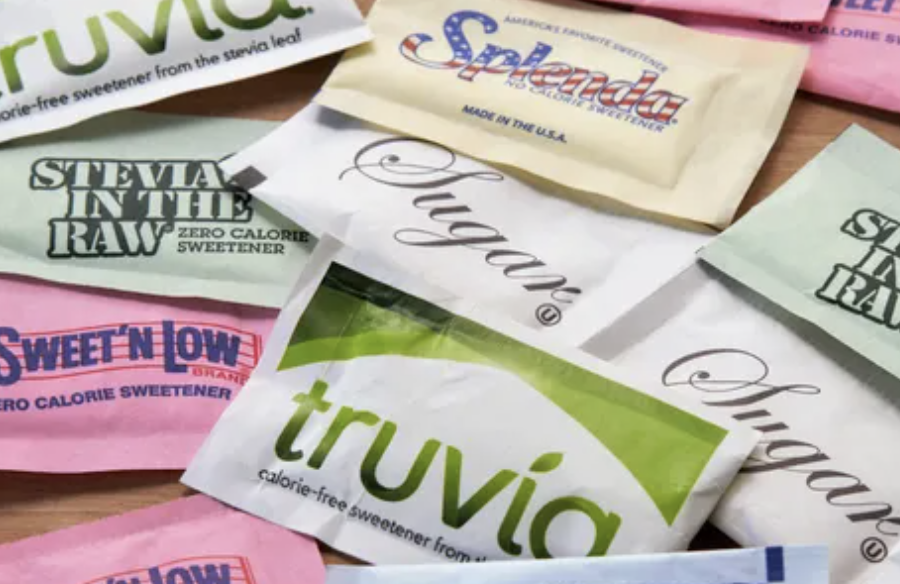The sweetener erythritol has been linked to a dramatically increased risk of cardiovascular problems.
Erythritol is a four-carbon sugar alcohol naturally present in small amounts in fruits and vegetables, but at levels 1000 times higher in some processed foods such as pastries and ice creams. It is around two-thirds as sweet as sucrose and is increasingly popular as a natural sugar substitute.
However, a US study has found that people with higher levels of erythritol in their blood had a notably higher risk of cardiovascular problems. ‘The top 25% had twice the risk of heart attack, stroke and death compared to the bottom 25%,’ says Stanley Hazen, a cardiologist at Cleveland Clinic, Ohio, who led the research. ‘That places it on par with the strongest other cardiovascular risk factors, such as diabetes.’
Hazen did not set out to investigate sweeteners. Instead, blood samples were taken from 1157 patients undergoing cardiac risk assessments and followed for three years, to seek a chemical signature that could predict risk of heart attack or stroke. ‘If you treat existing risk factors like cholesterol, blood pressure and diabetes, you lower cardiac risk, but the majority of events continue to happen,’ says Hazen. He sought residual risk factors.
Erythritol stood out as the best predictor of heart problems – even above high cholesterol levels. The researchers then measured erythritol levels in a US patient group and a European patient group who all had or were at risk of heart disease. Individuals with high erythritol levels in these groups had double the risk of heart attack or stroke.
This means that seven serious cardiovascular events would be expected over three years for every 100 people in the quarter of the US group with the lowest erythritol levels, explains Kevin McConway, emeritus professor of statistics at the Open University, who wasn’t involved in the study. By contrast, 12 serious cardiovascular events would be expected in the quarter with the highest erythritol levels, with a margin of error between nine and 18. The margin of error is even wider for the European cohort. Conway stresses that it’s important to note that the study can’t tell use whether the increase is actually caused by erythritol or some other factor, though.
Next, cell experiments revealed that erythritol boosted aggregation of platelets – cells that adhere to and heal damaged blood vessels. ‘Erythritol is lowering the threshold for making a platelet adhere to a surface, which is the first step in forming a clot,’ says Hazen. Further studies then showed that the sweetener sped up the formation of clots in mice with injured blood vessels.
To test the effects of eating erythritol in humans, eight healthy volunteers consumed a drink sweetened with 30g of the sugar. This is the kind of quantity someone could consume in a can of an artificially sweetened drink or a pint of keto diet ice cream. Following consumption of the drink, erythritol plasma levels spiked and remained 1000 times higher for hours, staying above the threshold linked to heightened clotting risks for more than two days.
Hazen says that after eating a large portion of keto-diet friendly ice cream, people in at risk groups would be at a heightened risk of experiencing a clot. He is concerned that the very people most vulnerable to heart attacks or strokes – such as those trying to lose weight or with diabetes – will most likely consume foods with artificial sweeteners.
‘I’m counselling my patients, if you are at risk for cardiovascular disease, you should avoid highly processed foods,’ says Hazen. ‘Read the label and make sure there is no erythritol.’
Cardiac epidemiologist Noel Mueller at Johns Hopkins Bloomberg School of Public Health says this study does an exceptional job in bringing observational, in vitro, animal and dietary intervention studies together. But he warns that ‘the findings are based on observational studies, which could be confounded by other factors, such as if erythritol consumption is associated with a poor diet’, which is itself a risk factor for cardiovascular disease and could be contributing to the higher risk in those with high blood erythritol.
‘This definitely warrants further investigation of erythritol,’ Mueller says. ‘The next step would be to do a randomised control trial to see if this is truly causal.’ He praises the additional experiments as ‘strengthening the plausibility of these findings as potentially causal’.
Conway notes that the risk of major cardiovascular events was roughly doubled for the 25% with the highest levels of circulating erythritol, compared with the 25% with the lowest levels, but ‘there was essentially no difference between the quarter with the lowest erythritol levels and the middle two quarters’. ‘This perhaps indicates that any increases in risk are associated only with the high levels of circulating erythritol and therefore maybe with high levels of consumption,’ McConway notes.
Hazen notes that erythritol is made endogenously, too. ‘We appear to have discovered a new pathway that leads to disease, that is found in everybody,’ he concludes, ‘and you can make that pathway much worse by ingesting amounts that are only found in processed food.’
Dietitian Duane Mellor at Aston University emphasises that the pentose phosphate pathway in our body also generates erythritol, and it ramps up when someone has excess energy onboard. ‘It’s also upregulated by oxidative stress, which can be a result of obesity, type 2 diabetes, smoking, [lack of] physical activity,’ says Mellor. ‘Things we know are risk factors for cardiovascular disease.’
‘We cannot be sure that people who are at higher risk of heart attacks don’t make more [erythritol],’ adds Mellor. He views the sweetener as of potential concern only for those trying to replace sugar with sugar alcohols.
The European Food Safety Authority is currently re-evaluating 15 sweeteners, including erythritol. A spokesperson said that the working group experts will now look at the methods and results from the US study.
